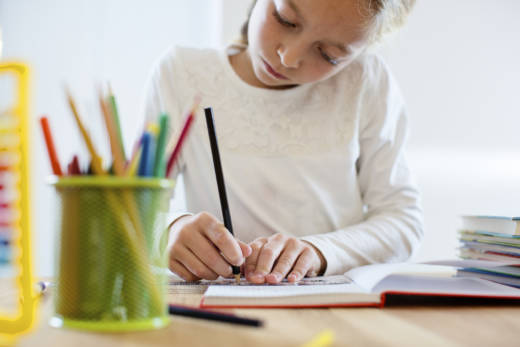Across the various questions, 5-year-old boys said their own gender was smart 71 percent of the time, compared to 69 percent of the time for girls. Among 6-year-olds, the numbers were 65 percent for boys and 48 percent for girls. And among 7-year-olds, it was 68 percent for boys and 54 percent for girls.
"The surprising thing is that already, by age 6, girls and boys are saying different things," says Sapna Cheryan, an associate professor of psychology at the University of Washington who wasn't involved with the research. "Before they've heard of physics or computer science they are getting these messages."
Another experiment showed that even as older girls were less likely to associate their own gender with brilliance, they (correctly) assessed that at their age, girls were more likely to get good grades in school.
And another experiment asked 6- and 7-year-olds about the appeal of two similar imaginary games, one intended for "children who are really, really smart," and one for "children who try really, really hard." Girls were less interested than boys in the game aimed at smart kids but interest was similar in the game for hard workers.
The research can't explain how these messages are getting to kids or how they could be changed, says Cimpian. He is planning a long-term study of young children that would measure environmental factors, including media exposure and parental beliefs. That would give a better idea of what factors predict the emergence of stereotypes, and what levers are available to change attitudes.
Research does suggest that role models might "inoculate" women and members of other underrepresented groups. So the movie Hidden Figures, about female African-American mathematicians at NASA during the late 1950s and early 1960s, could inspire girls and teens of color to pursue STEM fields.
But it's also important to step back and ask what the goal of any intervention should be, says Cheryan.
Girls, after all, were split about evenly in associating brilliance with their gender, she notes. The boys were more likely to make the association with their own gender. So do girls need help in thinking more like the boys, or vice versa? Cimpian says it's important not to fall into the trap of always assuming it's the girls who need to change. But he says that girls at this age are usually overwhelmingly positive about their own gender, so any deviation from that baseline may suggest the beginning of negative attitudes.
Another approach is to change the characterization of the academic fields themselves, namely that certain areas require inborn brilliance rather than hard work.
"Stereotypes are all about who has an innate ability," says Cimpian. If kids were instead exposed to the idea that success comes not because of fixed ability, but because of hard work over time (a so-called "growth mindset," the idea developed by Stanford psychologist Carol Dweck,) maybe those stereotypes would lose their punch.
Kids might also benefit from being exposed early on to fields like engineering, which aren't typically studied in high school, to demystify them, says Cheryan.
Katherine Hobson is a freelance health and science writer based in Brooklyn, N.Y. She's on Twitter: @katherinehobson.
Copyright 2017 NPR. To see more, visit http://www.npr.org/.
9(MDAxOTAwOTE4MDEyMTkxMDAzNjczZDljZA004))



9(MDAxOTAwOTE4MDEyMTkxMDAzNjczZDljZA004))